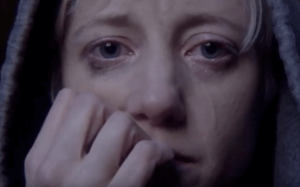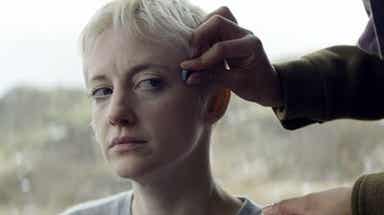"Crocodile", a Black Mirror Episode about Privacy

“Crocodile,” a Black Mirror episode about privacy and technology, will take you into a dystopian dilemma that may be closer than you think. Imagine that the most shameful episode of your life could come to light through a new technological application. Would you be able to control your memories before they came to light? How far would you go to hide them?
The episode presents a world where surveillance takes place inside people’s brains and anyone can access it, especially if it involves a crime.
However, this dystopian future doesn’t really pose new moral dilemmas. This is because technology isn’t the villain of the film, only a novel trigger for people to act under guidance.
“Crocodile” is about “how human beings actually work and how we would respond to something the tech revolution may well bring into our lives.”
-John Hillcoat-

“Crocodile”, a tragedy that technology can’t erase
After a dance party in Iceland, Mia (Andrea Riseborough) and Rob (Andrew Gower), who’s drunk, drive home and accidentally hit a cyclist in their path. Mia begs him to call the police, but he convinces her to get rid of the body and not be accountable for the accident.
Mia reluctantly helps him hide the evidence. Both the man’s body and his bicycle disappear at the bottom of a fjord. Out of sight, out of mind, right?
Years later, Mia is a successful architect, powerful businesswoman, and stay-at-home mother. The drugs, alcohol, Rob, and sweat-soaked dances seem to be a thing of the past.
A shameful memory
Mia is preparing a conference during a stay in a hotel where her boyfriend shows up. Rob is still full of guilt and pain and hasn’t overcome what he did several years ago. He finally decides to reveal his secret when he sees the victim’s ex-wife in a newspaper and learns about her pain.
Rob explains to Mia that he’s going to confess what they both did in their youth to the police. She disagrees and becomes increasingly nervous. After an argument and a struggle, she shuts Rob up for good by pushing him to the ground and suffocating him. As she thinks about how to get rid of his body, she looks out the window of her hotel. Unfortunately for her, she witnesses a pizza delivery cart running over a passerby.
It’s then that Shazia, an insurance company investigator, seeks her out as a witness. Using her “recaller” of memories, she tries to find someone who can testify against the pizza company. That person is Mia, unfortunately for her and her entire family.
“Crocodile” has another main character: “the recaller”
The device that Shazia uses, the “recaller”, is a memory extractor that can turn you into the accidental witness of a compromising situation. It doesn’t even need to be a crime. In “Crocodile”, human evil emerges organically with minimal intervention from the “recalled”.
In this episode, a device the size of a small button, placed on a person’s temple, allows a person to view another’s memories or “enneagrams” on a nearby screen. Everyone from insurance adjusters to police officers can legally use it. People become living recording cameras and can’t avoid it.
The descent into hell
Mia can’t escape Shazia or the “recalled”. Thus, it’s either that or confronting the police, who’ll use the same means and throw her without a word into a cell if she refuses. Stimulating her memory, Shazia sees how Mia murdered a man in cold blood on the night of the hit-and-run on her small screen.
Mia then has two choices: either scare Shazia enough so that she’ll never tell what she saw on her device or finish her off and not risk being ratted out. She chooses the latter, despite Shazia’s assurances that she’ll never reveal what she saw.
It’s then when she discovers that Shazia’s husband knows all the details of her case, including name and address. Thus, quite determined not to let it come to light, she bursts Shazia’s husband’s skull and also takes a baby’s life. It’s awful, though an expected outcome in Mia’s descent into hell.

Crocodile tears
Mia cries every time she kills and even apologizes to her victims, but that doesn’t stop her from doing so. Thus, her remorse and teary eyes don’t make her less guilty. In fact, she’s as cold and terrifying as any horror villain when she goes outside her victim’s house dressed in black and wielding a hammer.
The technologies offered by Charlie Brooker in Black Mirror are always delighting at first. Furthermore, those who have them are convinced they can’t do without them — without the pleasure they provide that is. They’re not compulsory though, it’s all just a hoax that civilized society swallowed at some point.
In the end, the true character of people comes to light, with or without technology, although perhaps certain circumstances do make it more dramatic.
Technology isn’t the villain in “Crocodile”
As in life, people willingly fall into a trap in most TV series. However, this one presents technology as a tool to detect injustice and fraud while being able to access memories people don’t wish to reveal.
Once again, it’s about the decision of having privacy or more control over society. That little device makes you think that, perhaps, it’s easier to find out wrongs a person did. However, you don’t really know to what extent a person will go in order to protect their secrets. What are they capable of doing against others or even against themselves.
Selfishness, comfort, and coldness are often latent until something triggers them. Thus, technology isn’t the villain here. The recalled episode reveals what all humans are capable of doing. Mainly when we feel threatened by someone’s nosiness in regard to our past actions.
This text is provided for informational purposes only and does not replace consultation with a professional. If in doubt, consult your specialist.








